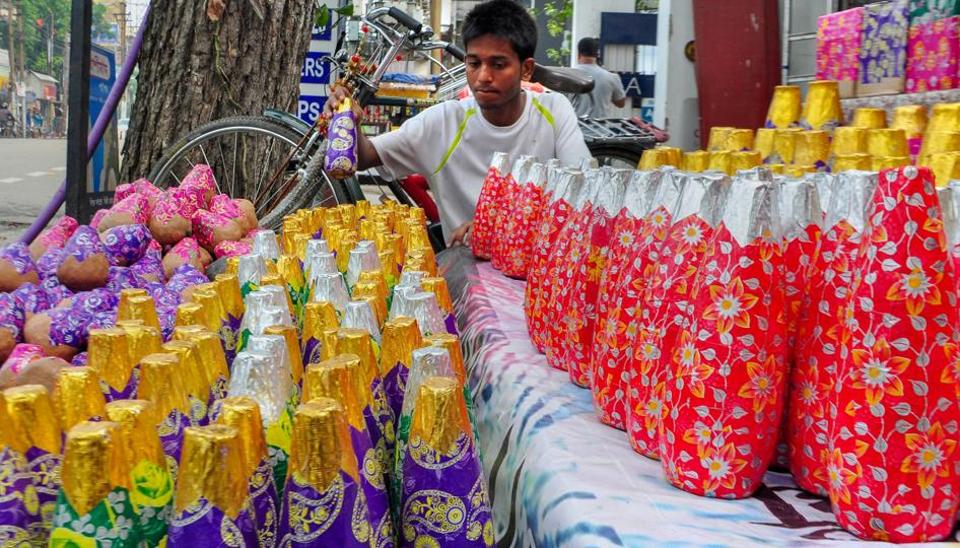
Last-minute cracker ban will cut pollution, but cost poor their livelihood
Bursting firecrackers was never good for air and human health. The Covid-19 pandemic only reaffirmed the fact that toxic fumes that emanate with light from these little boxes of explosives are a sure way to ill health, if not death. Why then did the authorities wake up at the 11th hour to ban them when a corona-struck population, depressed over the last eight months of nothingness, was getting ready to enjoy them?

Bursting firecrackers was never good for air and human health. The COVID-19 pandemic only reaffirmed that toxic fumes that emanate with light from these little boxes of explosives are a sure way to ill health, if not death. Why then did the authorities wake up at the 11th hour to ban them when a corona-struck population, depressed over the last eight months of nothingness, was getting ready to enjoy them?
Also watch: Inside Aarey forest: Trees cut, lives uprooted for adivasis
In the first week of November, the National Green Tribunal (NGT) put a ban on the sale of all types of firecrackers until the end of November in cities where the average of ambient air quality in November last year was ‘poor’ or worse. In West Bengal too Diwali and Chhath Puja celebrations will be impacted by the Calcutta High Court’s similar ban on crackers. The Supreme Court has upheld the ruling, but the states are in a fix as they struggle to interpret the verdict in their own way. Some have decided to uniformly implement the ruling across their state while most others have selectively opted for either ‘green crackers’ or banned the Chinese ones.
The Sivakasi fireworks industry, the biggest in India, is estimated to lose ₹800 crore, which will impact the livelihood of about 8 lakh people. So much for protecting the employment of the needy!
The loss that lakhs of traders across the country, mostly small shopkeepers, would suffer is difficult to fathom. The cumulative effect will be visible on the ability of their families to spend and enjoy the way probably others would. Less cash to spend would then impact other businesses like clothing, electricals, sweetmeat shops, appliances, automobiles etc. A cumulative or a ripple effect, as you may call it, will affect everyone.
Also read: Paying farmers for carbon credits could nudge them from burning paddy straw
While the sudden lockdown imposed on March 25 can be justified, a knee-jerk reaction of suddenly taking crackers out of the market cannot be, under any circumstances. The fireworks industry works for 10 months for a sale which majorly takes place in a month. The producers lost the marriage season in summer (due to lockdown), followed by muted Ganesh and Navaratri festivities. Diwali gave them hope, but that too was shattered by this last-minute ban.
Most BJP-ruled states, like Karnataka and Madhya Pradesh, have partially withdrawn the ban after the initial euphoria ended. Under pressure from its own partymen and their vested interests, they have looked for convenient way outs. While Chief Minister Shivraj Singh Chouhan has banned sale of Chinese crackers in MP, his Karnataka counterpart Yediyurappa has permitted sale of ‘green crackers’ only. Developed by the Council for Scientific and Industrial Research (CSIR), ‘green crackers’ emit pollutants at a 30% lesser rate than the conventional ones.
Also read: Nashik grape farmer weeds out weather vagaries with forecast station, sensors
If only the people at the helm had envisioned the cracker-pollution-corona connection some months back, the whole country could have gone for ‘green crackers’ – thus protecting the industry and its employees without diluting revellers’ enthusiasm.
Even today, the ban may not see a complete implementation in the absence of a robust monitoring mechanism. So, the manufacturers will suffer losses and a majority of revelers would be deprived of the fun. The only beneficiaries will be the black marketers who would make a killing by selling the crackers at exorbitant prices. So who is the beneficiary?
Had the decision-makers clamped the restrictions earlier, the poor factory workers could have looked for alternative sources of income and the supply-chain people and traders would have focused their energies on some other engagements. By the way, has there been any discussion and decision on how to dispose of these huge piles of explosives now? What a waste of time, energy and resource, indeed!
I am, by no way, justifying the use of crackers. As an environmentalist, I am dead against such a crass idea of celebration. In fact, there is no evidence to prove the people of Ayodhya burst firecrackers to celebrate the homecoming of Rama (the reason for Diwali celebration). However, I do firmly believe that nature cannot be cared for at the cost of lost opportunities for the poor.
Equity, after all, is and should always remain at the centre of a viable environment protection movement. Or, it may end up as an elite class’ tirade against what it assumes to be ‘an attack on the environment.’

